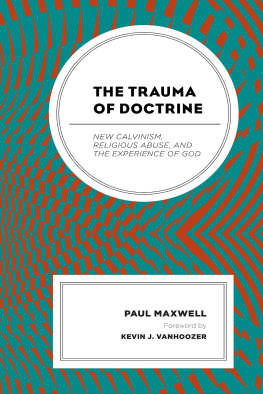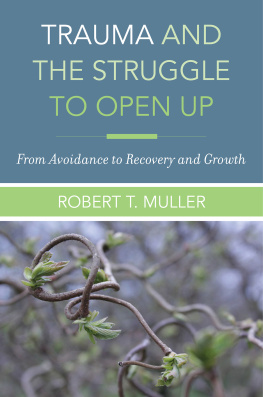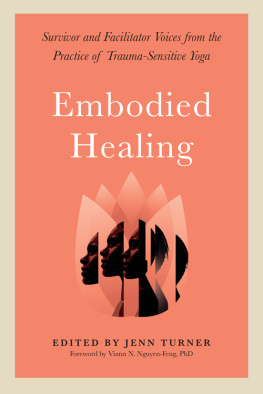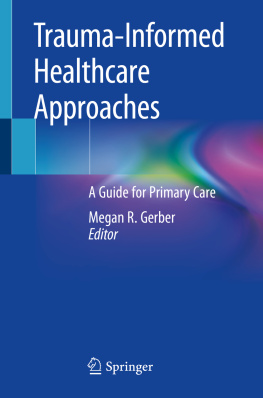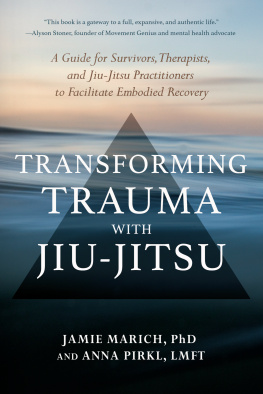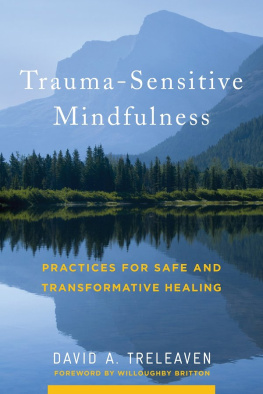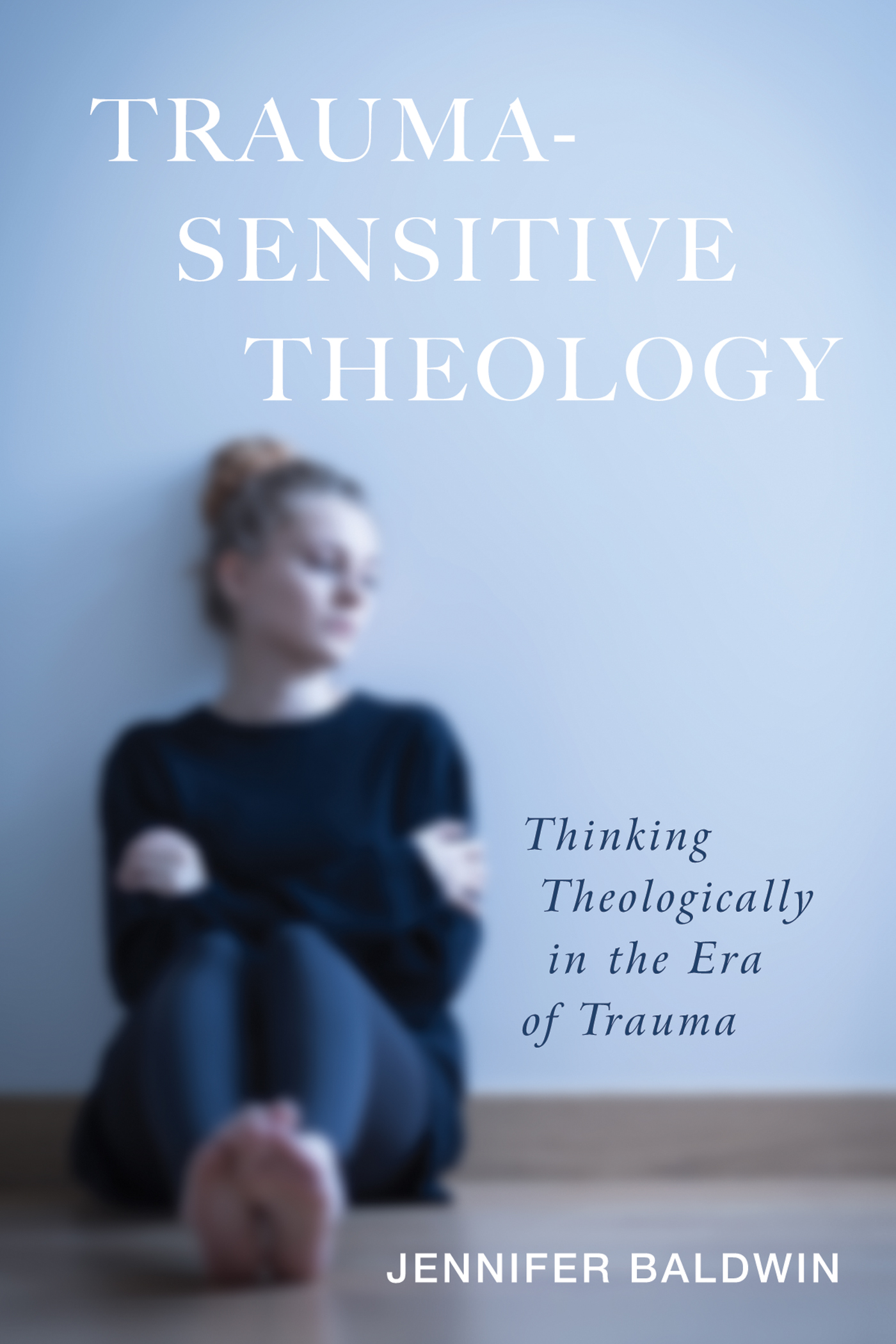W riting a monograph is a labor of love. The labor of love is not only the work of the author; it is shared by those who support and nurture the work along the way. I desire to express my sincere gratitude to those who have travelled with me along the journey of constructing a trauma-sensitive theology: Antje Jackeln, Richard F. Wilson, Monica Coleman, Vitor Westhelle, and Lea Schweitz. This work is a blending of my theological and clinical work. I am forever grateful for the community of Internal Family Systems including trainers and learning partners in this remarkable model: Susan McConnell, Terrilee Dalton, Arlene Brennan, Mary Steege, Beth ONeil, and Richard Schwartz for developing the model. Thank you to my movement communities for offering space to connect with moving wisdom: Susan Cahill, Marlo Fisken, Heidi Coker, authentic movement group partners, the 5 Rhythms community in Atlanta, and the tap, pole, and aerial dance communities. Elonda Clay, thank you for being my academic partner-in-crime, ever present source of encouragement, and creative instigator. Your friendship has been a gift, your conversation always enlightening and encouraging, and your collegiality a source of inspiration and motivation. Carol Schickel, thank you for your support through all of the ups and downs of academic work, helpful and thoughtful reading of this text, clinical mentorship that has contributed to who I am as a therapist, and your encouragement and compassion.
To my clients and the community of survivors, your resiliency continues to remind me of the tremendous strength that dwells within. You are who I do theological work on behalf of. I only hope this book reflects my deep respect, desire to honor your experience, and demonstrate my deep abiding faith in hope and resiliency, especially in the darkest of nights. Thank you to my family who has extended love to me and who have contributed to making me the person I am. Lynn Crawford, thank you for listening and supporting as I worked my way through roadblocks, and for your reading of this manuscript. My gratitude to Nick Cappello, my partner, who graciously gave up many weekends of companionship to support the writing of this work and made sure I never went hungry. Finally, thank you to Charlie Collier and the staff of Cascade Books for your faith in this work and patience in its reception.
Introduction
Moving towards a Trauma-Sensitive Theology
What is Trauma-Sensitive Theology?
F or centuries the church has been a place of faith, community, hope, ritual practice, and support during experiences of loss and grief. Religious faith across traditions fundamentally seeks to provide people with a way of understanding the world and their experiences within it. Questions such as How did human beings come to be?, What is our place in this world?, and How do I make enough sense of suffering to be able to continue? are some of the key existential concerns which religious faith and practice has sought to answer with the best knowledge available at the time. Of course, as time progresses we learn more and more, and the answers that made sense of the world in 1000 BCE are different than the answers that make sense in 33 CE or 2020 CE. The ability and mandate to allow religious thinking and practice to mature is at the heart of healthy and wise religious practice. It is one of the key hallmarks of the Reformation era within Christianity. Christian faith, confession, and practice must continue to mature in order to resist stagnation and static adherence that calcifies into the kinds of rigid religiosity that understandably fall prey to accusations of irrelevance, dogmatism, pathogensis. Likewise, we must have the courage, confidence, and clarity to re/form our theology and liturgy so that it continues to make use of the best knowledge of our time for the benefit, growth, and health of individuals, communities, and society. Making use of the best knowledge of our timewhether that be the insights of astrophysics, evolution, psychology, economics, or politicsdoesnt mean that we have to abandon the narratives of faith that support our meaning making. However, it does require us to venture beyond our safe familiarity in order to meet the present needs and understandings of our world.
Trauma-Sensitive Theology is a venture into a re/formation of Christian theology and practice with the intention of honoring the stories of faith that have nourished past generations while infusing those narratives with the wisdoms of contemporary knowledge in order to meet the variety of needs of persons and communities struggling under the burden of traumatic experience/s and response.
The Impetus for Constructing Trauma-Sensitive Theology
In one sense, the phrase Trauma-Sensitive Theology emerged during the dissertation phase of my doctoral work in systematic theology with an emphasis in religion and science. It developed over the process of engaging in clinical practice as a psychotherapist, exploring the area of trauma studies, traumatology, as a researcher, attuning to the rhythms of congregational life as a clergy person, and reflecting on the role of the divine and religion in our lives as a systematic constructive theologian. In another sense, Trauma-Sensitive Theology reflects my own journey as a person of faith attempting to find a way through trauma. It is a journey that far too many of us, especially women and persons of color, travel. While the particular stories of our encounters with violence differ, the process of recovering from encounters that overwhelm us are similar. When it comes to how we, as a society, as communities of faith/s, and as individuals, understand and talk about trauma, I dont get to sit on the side lines; talking about trauma is not theoretical in my life, it is one of the primary stories of my life. So, I come to this book as much as a survivor of trauma as I do a theologian or mental health clinician.
My position as survivor, clergy, theologian, and clinician are essentially formative and informative for this work. It is difficult to parse out which part of my larger self is any more engaged than the others since all of those parts of me bring a distinctive fundamental commitment to this work. My survivor part is insistent that survivors of trauma are respected, honored, and have the required space for restoration from traumatic injury. Survivors are not shattered, annihilated, nor existentially undone as other theologians have named them to be. Survivors are wounded, resilient, burdened, wise, challenged, fearful, courageous, and persistent. As a survivor of trauma, I have felt the crushing weight of traumatic responsesnightmares, flashbacks, numbing, hypervigilance, difficulty trusting, craving safety. At times, I have felt broken or shattered; though, I also learned that feeling and being are different things. I have felt spoiled and given my whole being to Christianity, God, and Jesus as a way of becoming clean again. I have felt Gods promises seemingly crumble under the force of post-traumatic response. And, I have found a more expansive path for honoring the vivifying power of the divine in all. Being a survivor of trauma and a person of faith are not mutually exclusive and faith does not exclude one from or prevent post-traumatic responses. Actually, I am a survivor of traumatic experience and a survivor of post-traumatic response.


